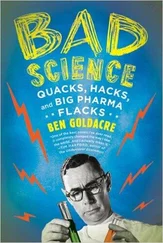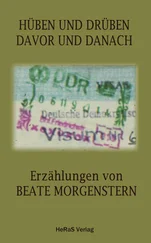Ben Goldacre - Bad Science
Здесь есть возможность читать онлайн «Ben Goldacre - Bad Science» — ознакомительный отрывок электронной книги совершенно бесплатно, а после прочтения отрывка купить полную версию. В некоторых случаях можно слушать аудио, скачать через торрент в формате fb2 и присутствует краткое содержание. Жанр: Публицистика, на английском языке. Описание произведения, (предисловие) а так же отзывы посетителей доступны на портале библиотеки ЛибКат.
- Название:Bad Science
- Автор:
- Жанр:
- Год:неизвестен
- ISBN:нет данных
- Рейтинг книги:5 / 5. Голосов: 1
-
Избранное:Добавить в избранное
- Отзывы:
-
Ваша оценка:
- 100
- 1
- 2
- 3
- 4
- 5
Bad Science: краткое содержание, описание и аннотация
Предлагаем к чтению аннотацию, описание, краткое содержание или предисловие (зависит от того, что написал сам автор книги «Bad Science»). Если вы не нашли необходимую информацию о книге — напишите в комментариях, мы постараемся отыскать её.
Bad Science — читать онлайн ознакомительный отрывок
Ниже представлен текст книги, разбитый по страницам. Система сохранения места последней прочитанной страницы, позволяет с удобством читать онлайн бесплатно книгу «Bad Science», без необходимости каждый раз заново искать на чём Вы остановились. Поставьте закладку, и сможете в любой момент перейти на страницу, на которой закончили чтение.
Интервал:
Закладка:
In the case of homeopathy, similarly, homeopaths want to believe that the power is in the pill, rather than in the whole process of going to visit a homeopath, having a chat and so on. It is crucially important to their professional identity. But I believe that going to see a homeopath is probably a helpful intervention, in some cases, for some people, even if the pills are just placebos. I think patients would agree, and I think it would be an interesting thing to measure. It would be easy, and you would do something called a pragmatic ‘waiting-list-controlled trial’.
You take two hundred patients, say, all suitable for homeopathic treatment, currently in a GP clinic, and all willing to be referred on for homeopathy, then you split them randomly into two groups of one hundred. One group gets treated by a homeopath as normal, pills, consultation, smoke and voodoo, on top of whatever other treatment they are having, just like in the real world. The other group just sits on the waiting list. They get treatment as usual, whether that is ‘neglect’, ‘GP treatment’ or whatever, but no homeopathy. Then you measure outcomes, and compare who gets better the most.
You could argue that it would be a trivial positive finding, and that it’s obvious the homeopathy group would do better; but it’s the only piece of research really waiting to be done. This is a ‘pragmatic trial’. The groups aren’t blinded, but they couldn’t possibly be in this kind of trial, and sometimes we have to accept compromises in experimental methodology. It would be a legitimate use of public money (or perhaps money from Boiron, the homeopathic pill company valued at $500 million), but there’s nothing to stop homeopaths from just cracking on and doing it for themselves: because despite the homeopaths’ fantasies, born out of a lack of knowledge, that research is difficult, magical and expensive, in fact such a trial would be very cheap to conduct.
In fact, it’s not really money that’s missing from the alternative therapy research community, especially in Britain: it’s knowledge of evidence-based medicine, and expertise in how to do a trial. Their literature and debates drip with ignorance, and vitriolic anger at anyone who dares to appraise the trials. Their university courses, as far as they ever even dare to admit what they teach on them (it’s all suspiciously hidden away), seem to skirt around such explosive and threatening questions. I’ve suggested in various places, including at academic conferences, that the single thing that would most improve the quality of evidence in CAM would be funding for a simple, evidence-based medicine hotline, which anyone thinking about running a trial in their clinic could phone up and get advice on how to do it properly, to avoid wasting effort on an ‘unfair test’ that will rightly be regarded with contempt by all outsiders.
In my pipe dream (I’m completely serious, if you’ve got the money) you’d need a handout, maybe a short course that people did to cover the basics, so they weren’t asking stupid questions, and phone support. In the meantime, if you’re a sensible homeopath and you want to do a GP-controlled trial, you could maybe try the badscience website forums, where there are people who might be able to give some pointers (among the childish fighters and trolls …).
But would the homeopaths buy it? I think it would offend their sense of professionalism. You often see homeopaths trying to nuance their way through this tricky area, and they can’t quite make their minds up. Here, for example, is a Radio 4 interview, archived in full online, where Dr Elizabeth Thompson (consultant homeopathic physician, and honorary senior lecturer at the Department of Palliative Medicine at the University of Bristol) has a go.
She starts off with some sensible stuff: homeopathy does work, but through non-specific effects, the cultural meaning of the process, the therapeutic relationship, it’s not about the pills, and so on. She practically comes out and says that homeopathy is all about cultural meaning and the placebo effect. ‘People have wanted to say homeopathy is like a pharmaceutical compound,’ she says, ‘and it isn’t, it is a complex intervention.’
Then the interviewer asks: ‘What would you say to people who go along to their high street pharmacy, where you can buy homeopathic remedies, they have hay fever and they pick out a hay-fever remedy, I mean presumably that’s not the way it works?’ There is a moment of tension. Forgive me, Dr Thompson, but I felt you didn’t want to say that the pills work, as pills, in isolation, when you buy them in a shop: apart from anything else, you’d already said that they don’t.
But she doesn’t want to break ranks and say the pills don’t work, either. I’m holding my breath. How will she do it? Is there a linguistic structure complex enough, passive enough, to negotiate through this? If there is, Dr Thompson doesn’t find it: ‘They might flick through and they might just be spot-on … [but] you’ve got to be very lucky to walk in and just get the right remedy.’ So the power is, and is not, in the pill: ‘P, and not-P’, as philosophers of logic would say.
If they can’t finesse it with the ‘power is not in the pill’ paradox, how else do the homeopaths get around all this negative data? Dr Thompson – from what I have seen – is a fairly clear-thinking and civilised homeopath. She is, in many respects, alone. Homeopaths have been careful to keep themselves outside of the civilising environment of the university, where the influence and questioning of colleagues can help to refine ideas, and weed out the bad ones. In their rare forays, they enter them secretively, walling themselves and their ideas off from criticism or review, refusing to share even what is in their exam papers with outsiders.
It is rare to find a homeopath engaging on the issue of the evidence, but what happens when they do? I can tell you. They get angry, they threaten to sue, they scream and shout at you at meetings, they complain spuriously and with ludicrous misrepresentations – time-consuming to expose, of course, but that’s the point of harassment – to the Press Complaints Commission and your editor, they send hate mail, and accuse you repeatedly of somehow being in the pocket of big pharma (falsely, although you start to wonder why you bother having principles when faced with this kind of behaviour). They bully, they smear, to the absolute top of the profession, and they do anything they can in a desperate bid to shut you up , and avoid having a discussion about the evidence. They have even been known to threaten violence (I won’t go into it here, but I manage these issues extremely seriously).
I’m not saying I don’t enjoy a bit of banter. I’m just pointing out that you don’t get anything quite like this in most other fields, and homeopaths, among all the people in this book, with the exception of the odd nutritionist, seem to me to be a uniquely angry breed. Experiment for yourself by chatting with them about evidence, and let me know what you find.
By now your head is hurting, because of all those mischievous, confusing homeopaths and their weird, labyrinthine defences: you need a lovely science massage. Why is evidence so complicated? Why do we need all of these clever tricks, these special research paradigms? The answer is simple: the world is much more complicated than simple stories about pills making people get better. We are human, we are irrational, we have foibles, and the power of the mind over the body is greater than anything you have previously imagined.
At proper high doses, Cinchona contains quinine, which can genuinely be used to treat malaria, although most malarial parasites are immune to it now.
For pedants, it’s a 30.89C dilution.
Читать дальшеИнтервал:
Закладка:
Похожие книги на «Bad Science»
Представляем Вашему вниманию похожие книги на «Bad Science» списком для выбора. Мы отобрали схожую по названию и смыслу литературу в надежде предоставить читателям больше вариантов отыскать новые, интересные, ещё непрочитанные произведения.
Обсуждение, отзывы о книге «Bad Science» и просто собственные мнения читателей. Оставьте ваши комментарии, напишите, что Вы думаете о произведении, его смысле или главных героях. Укажите что конкретно понравилось, а что нет, и почему Вы так считаете.





![Роман Зыков - Роман с Data Science. Как монетизировать большие данные [litres]](/books/438007/roman-zykov-roman-s-data-science-kak-monetizirova-thumb.webp)






